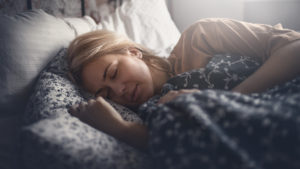
Setting a bedtime is commonly recommended for better and more consistent sleep. But does it really work? It doesn’t for me. The fact is that if I’m not tired, I’m not sleeping. Staying in bed to toss and turn can keep people awake for hours.
That’s why I, and many others, ignore this information. Thankfully, sleep experts are not dogmatic about setting a bedtime and also recommend getting out of bed if you can’t sleep. Others recommend only going to bed once you’re feeling sleepy.
This makes plenty of sense, doesn’t it? If you’re not tired or ready for sleep, it doesn’t make a difference where you are. Your living room or bed would be one in the same. Except for one major difference: there are things to do in your living room.
In bed, you’ll likely just lay there with a racing mind and end up frustrated and likely falling asleep even later.
If you’ve gone to bed but find yourself laying there 20 minutes after the lights have gone out and you’re all tucked in, get up and move to another room. That’s right, get out of bed and go do something else.
Sitting quietly and doing some reading, knitting, working on a puzzle, or some other relaxing activity can help your brain and body relax and get better prepared for sleep. After about 20-30 minutes, you’ll likely begin to feel tired.
Likewise, if your set “bedtime” rolls around and you’re just not tired, don’t force yourself to go to bed. Instead, stay up a bit later. If you’re watching an intense television show or reading the news, however, you may want to switch to something a bit lighter.
In these cases, it is probably a good idea to take a warm bath, do some reading, or another relaxing activity that doesn’t involve screens. You’ll want to avoid too much stimulation in order to give yourself the best opportunity to relax.
If you can’t sleep, give yourself a break. Go to bed when you’re feeling tired, but at the same time develop practices that encourage relaxation in the hour or so leading up to bedtime. Doing so may encourage longer and better sleeps.